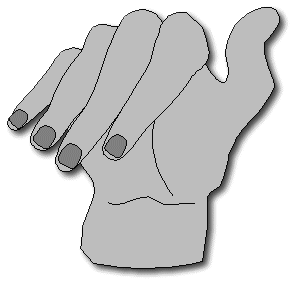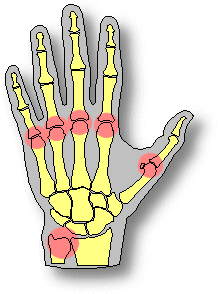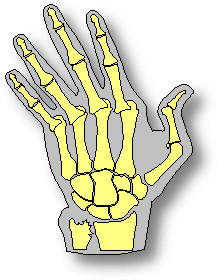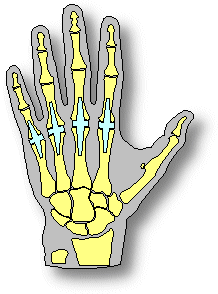
| What is it? |
-
Rheumatoid arthritis is a medical condition in which the immune system
attacks and damages many parts of the body, including the hands. Rheumatoid
arthritis is primarily treated by medical doctors, and may require treatment
by an arthritis specialist. Medical resources on rheumatoid and other arthritic
conditions are available through the American
College of Rheumatology.
|
| What caused it? |
-
The reasons for developing rheumatoid arthritis are not currently known.
What is known is that people with rheumatoid arthritis have inflammation
or irritation of many of the moving parts of their bodies, including the
joints and tendons. This causes pain, swelling, weakness, and over time,
loss of the normal shape and alignment of joints. Swelling around the tendons
can lead to trigger fingers and carpal
tunnel syndrome.
| In the hand, any joint can be affected, but
common problem areas include the big knuckles of the fingers (the metacarpophalangeal
joints) and the wrist bone on the side of the small finger (the ulnar head
and distal radioulnar joint). Osteoarthritis is a more common type of arthritis,
and different than rheumatoid in that it is much less likely to affect
these joints. |
|
 |
|
| What can you do to help? |
-
If you have any questions about the overall picture of rheumatoid arthritis,
you should discuss them with your medical doctor. Rheumatoid is first and
foremost a medical disorder, treated with medication, and surgery is an
option to consider if medical treatment does not provide adequate control.
-
If you have rheumatoid arthritis, you should do all you can to learn about
the disorder and what you can do to promote your own heath.
|
| What can a therapist do to help? |
-
A hand therapist can provide advice on living with rheumatoid, and give
helpful information on how to live one's life without aggravating or accelerating
the damage caused by rheumatoid. This is often referred to as a "joint
protection program".
-
Therapists can also provide some special tools to assist people whose hands
have been damaged by rheumatoid perform routine daily activities. These
are called "adaptive devices".
-
If surgery is required, therapy after surgery is very important. Custom
splints may need to be made and maintained by a skilled hand therapist.
|
| What can a doctor do to help? |
-
The main treatment of rheumatoid is with medicines. Your medical doctor
is your best resource to provide an evaluation with examination, X-rays
and blood tests. Some medicines used to treat rheumatoid need to be monitored
with periodic blood tests.
-
Cortisone shots into sore areas may be very helpful in relieving pain and
swelling.
-
If your medical doctor feels that you have a problem which would benefit
from surgery, you will be referred to an appropriate specialist. Generally,
this is a consideration only if your condition is not adequately relieved
with medicines.
-
Problems which might be helped by a hand surgeon include:
-
Persistent joint pain and swelling despite medication.
-
Pain when bending or straightening the fingers.
-
Numbness or tingling in the fingers.
-
Stiff, bent or locking fingers.
-
Inability to straighten the fingers.
| In time, rheumatoid can affect the alignment of the joints to such
an extent that they become stuck in a bent position or even completely
out of place - dislocated. Also, the ends of the bones may become rough
and irregular. When this happens in the wrist, the tendons which bend and
straighten the fingers may be sawed in half from chafing on the sharp edges
of bone - a tendon rupture. |
|
 |
There are many types of operations developed to correct these types
of problems. For example, the diagram to the right shows possible surgery
for problems in the diagram above it:
-
Finger Joint replacements with flexible silicone rubber spacers.
-
Fusing one of the thumb joints to a more functional position.
-
Removing the irregular end of the ulna bone at the wrist
(Darrach procedure).
|
|
 |
-
Surgery may be helpful to correct deformities caused by rheumatoid, but
may also be recommended to prevent problems before they occur - such as
tendon rupture.
|
| How successful is treatment? |
-
It really depends on what the problem is, but in general, carefully planned
surgery is worthwhile. Surgery is most helpful for correction of deformity
and for preventing tendon rupture. Surgery is less likely to help improve
the strength of the hand.
|
| What happens if you have no treatment? |
-
This really can't be predicted. Simple surgery to prevent tendon rupture
can help avoid complications which would require more extensive surgery
to correct. Surgery to correct nerve problems such as carpal tunnel syndrome
may prevent progressive nerve damage. Other than that, it is a quality
of life choice.
-
Some people have deformities which develop over a short period of time,
and then don't get much worse. Others gradually get worse and worse. Hands
injured by rheumatoid can not be made normal, but very often can be made
better with careful planning.
-
Not all problems require surgery, but the right operation can sometimes
make a big difference in the appearance and function of the hand.
|
|

